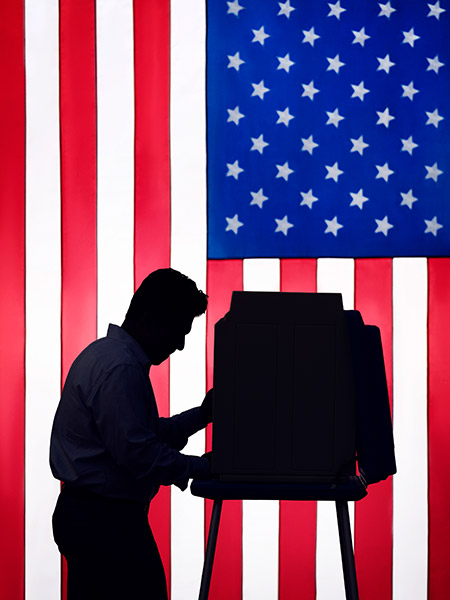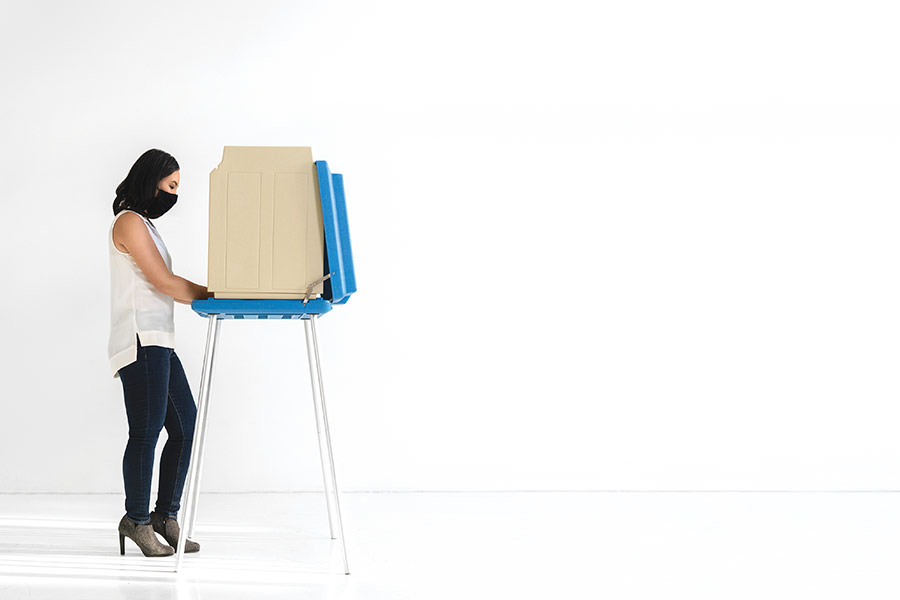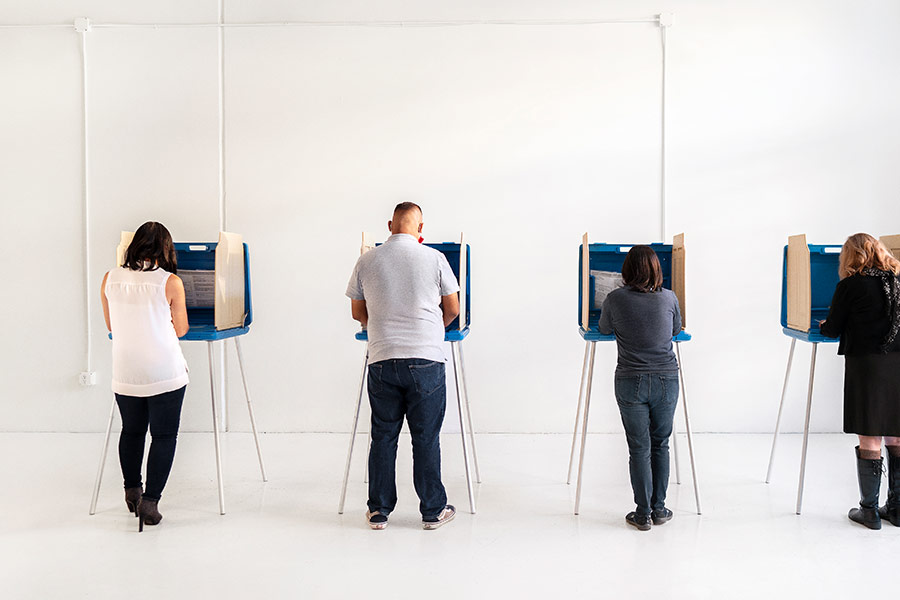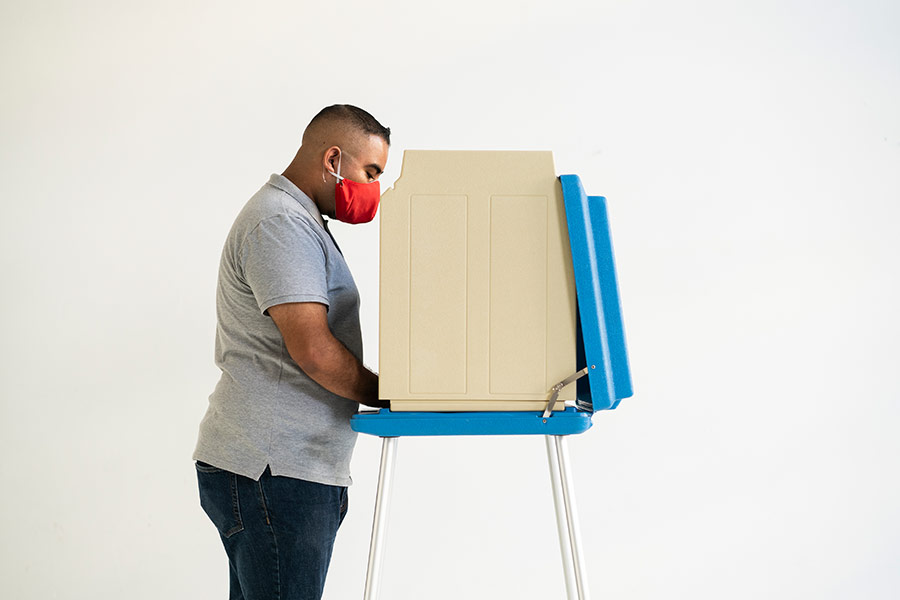Faithful Citizens: How you can make your ‘prophetic voice’ heard this election season
FORT WORTH — Father Balaji Boyalla, SAC, has an important milestone coming up — his first opportunity to vote in a United States presidential election.
A native of India, the pastor of St. Michael Parish in Bedford became a U.S. citizen on March 10, 2019. In his journey to American citizenship, the Pallottine priest saw the hand of God at work. The process of getting a visa, then a green card, then qualifying for citizenship “went so easily. Maybe God has called me to work here a long time,” he said.

Now, as a citizen, he stated, “My first responsibility is to vote. I am going to vote. I am not going to miss it. Everybody should vote. That is how we can make our prophetic voice heard, like Isaiah.”
The Catholic Church has much to say about the responsibilities of faithful citizenship, one of which is the duty to vote. However, the Church does not tell its faithful for which particular party or candidate to vote. Instead, the Church sees her role “in the formation of conscience and the corresponding moral responsibility of each Catholic to hear, receive, and act upon the Church’s teaching in the lifelong task of forming his or her own conscience,” according to Forming Consciences for Faithful Citizenship, a Call to Political Responsibility issued by the United States Conference of Catholic Bishops.
Those teachings are lenses through which candidates and political issues should be viewed, and they are founded on the four basic principles of Catholic social doctrine: the dignity of the human person, subsidiarity, the common good, and solidarity.
This time and place
Our responsibility as Catholics to make our voices heard in the public arena is a function of where and when we are living, explained Dr. David Upham, a professor of American politics at University of Dallas.
In the first few centuries after the resurrection, Christians lived under centralized despotism and did not have the opportunity to participate in governance. Living the Gospel, spreading the Gospel, and avoiding persecution — often unsuccessfully — were the priorities of early Catholics.
Fast forward to Catholics living in the United States today. Dr. Upham observed, “Where we find ourselves right now, in the providence of God, is we are a large — significantly large — minority in a free republic. We still have an enormous amount of political authority. Whether we like it or not, we share the throne.
“When God in His providence makes you a co-king, even though we’re one of 300 million, we probably then have a responsibility to try to take care of this community that’s been given to us to take care of as citizens with whatever we have: our voice, our money if we have some (consistent with our other obligations), and our vote,” he continued.
The professor, who is a parishioner at St. Francis of Assisi in Grapevine, cited three examples of when Catholic voices and votes have “been able to maintain a certain light in the darkness” during the previous century: against coercive sterilization of criminals and mentally handicapped individuals, against abortion, and in favor of racial equality.
He said, “It’s often obscured right now, but in the mid-20th century, one of most prominent public institutions in favor of desegregation was the Catholic Church,” which challenged laws prohibiting interracial marriage more than 20 years before the U.S. Supreme Court ruled on the subject.
Dr. Upham said U.S. bishops are often at the forefront of advocating for the common good and the dignity of each person. In their role as bishops, they have the authority and duty to speak on matters of faith and morals in accordance with the magisterium of the Church.
The professor and lawyer pointed out that the bishops, using their teaching authority, emphasize “principles like the duty of the community to protect the common good, or that the chief part of the common good is the protection of the lives of the innocent, including the duty to protect the lives of the unborn.”
Also, Dr. Upham added, an individual bishop may speak about a particular situation in a community in his role as a prominent citizen.

(NTC/Juan Guajardo)
The four pillars
If the Catholic Church does not prescribe how to vote to its members, what help can the Church offer in the cacophony found in election year advertising, social media, and conflicting news reports?
Father John Robert Skeldon, rector of St. Patrick Cathedral, said the Church brings “centuries of ethical and moral reflection upon core principles like the common good, solidarity among people, and the dignity of the human person.”
In lifetimes of teaching, plus hundreds of papal encyclicals, Vatican documents, and statements from the USCCB, the Catholic Church has expounded on the four principles of Catholic social teaching, which are “the expression of the whole truth about man known by reason and faith” (Compendium of the Social Doctrine of the Church, 160). The dignity of the human person, subsidiarity, the common good, and solidarity, when taken together, “anchor the Catholic commitment to defend human life, from conception until natural death, in the fundamental moral obligation to respect the dignity of every person as a child of God” (Forming Consciences for Faithful Citizenship, 40).
The dignity of the human person begins with the right to life, beginning at conception. The sanctity of human life is threatened by abortion, euthanasia, assisted suicide, the death penalty, human cloning, in vitro fertilization, and the destruction of human embryos for research.
Bishop Michael Olson said, “We must begin with respect and protection of the inviolable right to life, and we as Catholics cannot end there. To respect the inviolable right to life means that we must continue by respecting and advocating for the other necessary human rights that are contingent upon the right to life. We cannot consider that the indispensable and just opposition to all direct assaults on human life, especially abortion, is sufficient in itself for our responsibility to foster justice. It is also wrong to relativize abortion by claiming that it is just one of several equally important political issues.”
Catholic teaching on the dignity of life compels the faithful to oppose racism, torture, unjust war, and human trafficking. Understanding the sacredness of life calls us to strive to overcome starvation, poverty, and suffering.
In his homilies and pastoral letters, Bishop Olson frequently expounds on the rights that derive from considering the dignity of each human person.
He stated in his Sept. 20 homily, “To be clear, the right to life is the preeminent human right established and given by God Himself as the right upon which all other human rights depend” including: the integrity of human sexuality, marriage between one man and one woman, the right to religious liberty, the right to live in peace and security, the right to basic healthcare, and many others.
Subsidiarity, simply put, means to start small. It recognizes that matters should be handled by the smallest or lowest competent authority. Respect for the family, the fundamental unit of society, should be considered in a community’s policies and programs, and the parents’ rights and responsibilities to care for their children should be defended and strengthened.
“The principle of subsidiarity reminds us that larger institutions in society should not overwhelm or interfere with smaller or local institutions, yet larger institutions have essential responsibilities when the more local institutions cannot adequately protect human dignity, meet human needs, and advance the common good” (Forming Consciences for Faithful Citizenship, 48).
The common good indicates “the sum total of social conditions which allow people, either as groups or as individuals, to reach their fulfillment more fully and more easily” (Gaudium et Spes, 20).
Beyond the right to life, human beings have “a right to access those things required for human decency — food and shelter, education and employment, health care and housing, freedom of religious and family life,” stated the U.S. bishops in Forming Consciences for Faithful Citizenship.
In that document, the U.S. bishops encourage Catholics to look beyond their own self interests when voting and consider the common good, which includes ensuring the economic system serves people instead of vice versa and observing the duty to care for God’s creation.
Solidarity highlights the equality of all in one human family, regardless of our nationality, race, or socioeconomic background.
As Catholics, we promote peace and pursue justice, welcome the stranger, and embrace the vulnerable and most in need.
“A basic moral test for any society is how it treats those who are most vulnerable” (Forming Consciences for Faithful Citizenship, 53).
Bishop Olson, in his editorial in the September-October issue of the NTC, encouraged the faithful of the Diocese of Fort Worth to read the USCCB document Forming Consciences for Faithful Citizenship before the election. Not only does the statement from the U.S. bishops expand on the four pillars, but it summarizes how these principles can be applied to more than a dozen issues, from education to the media.
The document was first issued in 2007 and has been re-released every four years ahead of the presidential election.

(NTC/Juan Guajardo)
The starting point
Before we take our understanding of Catholic social teaching to the ballot box, we need to pray. Bishop Olson, Fr. Skeldon, and Fr. Boyalla emphasized the importance of prayer.
In addition to praying for a proper formation of conscience, Fr. Boyalla also mentioned regular prayer that God’s will be done, that good leaders will govern the country, and that the country will act morally for the common good of society. “We must pray for our country every day. It’s a responsibility recognized by Saint Peter and Saint Paul,” said the priest.
Fr. Skeldon recommended reading the Compendium of the Social Doctrine of the Church to gain a deeper understanding of Catholic social teaching. Studying Scripture helps, too.
He said, “The Bible has all of these stories of welcoming or receiving the stranger, the Other, precisely in their Otherness, honoring their dignity.”
The Other, he explained, includes both the unborn child and the undocumented immigrant. They both deserve respect and welcoming and reception because of their dignity as human persons created in the image and likeness of God.
Studying Scripture, Fr. Skeldon suggested, “may be a way to help people understand ‘Maybe I need to let loose of group think, of tribal think, of party think that I’m sort of indoctrinated in, and let the bigger picture come into focus.’”

(NTC/Juan Guajardo)
Party Primary
The divisions in society created by a hyperpartisan political atmosphere can be destructive. Fr. Boyalla has seen situations where church members, brothers and sisters, or even a husband and wife, are separated because they support different candidates or political parties.
He said, “We are called to pray together as one family, and politics can separate the Church family, so it’s always good to be people of God in one Church, putting politics away.”
But faithful Catholics are called to more than shunning division. They are called to be peacemakers, said the pastor.
“We also should serve as agents for reconciliation in a politically divided society. We should not become partisans.
“No politics, no personal differences should come in our way to think, to speak, or to do for the common good. No personal interests should disturb our work for the common good,” continued Fr. Boyalla.
Like Fr. Boyalla, Fr. Skeldon decried what he termed the “tribe of party” that has pervaded American society. He said by identifying more closely with one’s political party than one’s identity as a Catholic, the political party “sets the parameters, the boundaries, the definitions. That’s very limiting to the real truth of the Church’s social doctrine and teaching.”
He recommended Catholics can be peacemakers in the public sphere by “preaching, teaching, living, and talking … about the fullness of Catholic social doctrine and teaching, which is very rich. That can be brought to the conversation.”
In Forming Consciences for Faithful Citizenship, the U.S. bishops acknowledge, “These four principles and related themes from Catholic social teaching provide a moral framework that does not easily fit ideologies of ‘right’ or ‘left,’ ‘liberal’ or ‘conservative,’ or the platform of any political party. They are not partisan or sectarian, but reflect fundamental ethical principles that are common to all people.”
Furthermore, Bishop Olson said, “We also cannot misrepresent the Gospel of Life as only one part of a partisan platform or the fragmented positions of political candidates of any political party. To succumb to this temptation would make the Church subordinate to the power of the state through the public endorsement of candidates or the alignment of the Church with any one political party.”
Fr. Skeldon pointed out that in most cases, neither candidate will represent the totality of Catholic teaching, which necessitates the Catholic voter possess a well-formed conscience.
The ballot may look simple, but developing a well-formed conscience is a task for a lifetime. However, the Catholic Church has developed a moral framework to defend human life and dignity and to protect the weak and vulnerable that helps build a kingdom of peace and justice at all times, not just in election years.
Fr. Boyalla, preparing for his first U.S. presidential vote, gave advice that will last longer than any politician’s term in office. He said, “Most important, pray and reflect and look for the will of God in every choice you make.”
